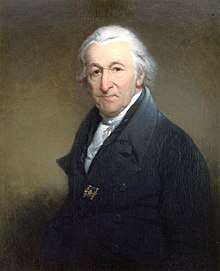
Back مارتين ڤان ماروم ARZ Martinus van Marum Catalan Martin van Marum Welsh Martinus van Marum German Martinus van Marum Spanish مارتن وان ماروم Persian Martin van Marum French Martinus van Marum Galician Martinus van Marum Dutch Martin van Marum Portuguese

Martin(us) van Marum (Dutch pronunciation: [ˈmɑrtɪn vɑn ˈmaːrʏm]; 20 March 1750, Delft – 26 December 1837, Haarlem) was a Dutch physician, inventor, scientist and teacher, who studied medicine and philosophy in Groningen. Van Marum introduced modern chemistry in the Netherlands after the theories of Lavoisier, and several scientific applications for general use. He became famous for his demonstrations with instruments, most notable the Large electricity machine, to show statical electricity and chemical experiments while curator for the Teylers Museum.
He researched on the validity of Boyle's law on gases other than air. He found that ammonium gas deviated from Boyle's law with increasing pressure, and it liquified at 7 atm. With this, he was the first to liquify ammonium.[1]
- ^ Ford, P. J. "Towards the absolute zero: The early history of low temperatures." South African Journal of Science 77.6 (1981): 244-248.